Last Updated on August 28, 2024
Navigating Winter Challenges with the Right Firestone Winterforce CV Tires for Trucks
Winter presents unique challenges for truck drivers, from slippery roads to decreased visibility. Ensuring your truck is equipped with the right tires is crucial for safe and efficient performance during these colder months. In this article, we’ll explore the various winter challenges trucks face and emphasize the importance of selecting the appropriate winter tires, such as the Firestone Winterforce CV.
Overview of Winter Challenges for Trucks
The following are the significant reasons truck owners need to be careful during winter seasons when driving:
- Decreased Traction: Winter conditions, including snow, ice, and slush, can significantly reduce the traction between your truck’s tires and the road surface. This can make accelerating, braking, and maintaining control difficult, increasing the risk of accidents.
- Temperature Fluctuations: Cold temperatures can cause tire pressure to drop, affecting the tire’s contact with the road and potentially leading to uneven wear or reduced fuel efficiency.
- Snow and Ice Accumulation: Heavy snowfall and ice can obstruct roads, making it challenging for trucks to navigate and maintain stability, especially on inclines or during turns.
- Visibility Issues: Winter weather can impair visibility, making it harder for drivers to see road markings, obstacles, and other vehicles, further complicating safe driving.
- Increased Wear and Tear: The harsh winter conditions can accelerate the wear and tear on tires, leading to a shorter lifespan and necessitating more frequent replacements.
Importance of Choosing the Right Winter Tires
Selecting the appropriate winter tires for your truck is essential for several reasons:
- Enhanced Traction: Winter tires are designed to provide better grip on snow, ice, and wet surfaces, thanks to their unique tread patterns and rubber compounds that remain flexible in cold temperatures.
- Improved Safety: With better traction and handling, winter tires help reduce the risk of accidents caused by slippery conditions. They also offer shorter braking distances, which can be crucial in emergencies.
- Increased Durability: High-quality winter tires, like the Firestone Winterforce CV, are built to withstand the rigors of cold weather and rough terrain, ensuring they last longer and perform consistently throughout the season.
- Optimized Performance: Winter tires are tailored to deliver optimal performance in cold conditions, helping your truck maintain fuel efficiency and reducing the overall strain on its components.
- Legal Requirements: In some regions, using winter tires during certain months is mandated by law. Failing to comply can result in fines and may also impact your insurance coverage in the event of an accident.
The Best Winter Tires for Trucks: Firestone Winterforce CV Tires for Trucks
Firestone Winterforce CV tires are truck tire brands primarily known for their excellent performance in winter conditions. Built to handle snowy and icy roads, they provide reliable traction and control for the tires and the driver. In other words, the Firestone Winterforce CV tires are popular among truck drivers during the winter season.
Key Features of Firestone Winterforce CV Tires for Trucks
Here’s a detailed look at what makes these tires stand out and why they’re a smart choice for your truck this winter.
- Specialized Tread Design: The Winterforce CV tires feature a directional tread pattern that enhances traction on snow and ice. The deep grooves and high-density siping ensure a firm grip on slippery surfaces, reducing the risk of skidding.
- Optimized Rubber Compound: These tires have a cold-weather flexing compound that remains pliable at lower temperatures. This allows for better contact with the road, even in freezing conditions.
- Reinforced Construction: Designed to handle heavier loads of commercial vehicles, the Winterforce CV tires have a reinforced internal structure that ensures durability and stability under the weight of your truck.
- Severe Snow Service Rated: These tires carry the 3-Peak Mountain Snowflake (3PMSF) symbol, indicating they meet the required performance criteria in snow testing to be considered severe snow service-rated.
- Studdable Design: For those needing extra traction, the Winterforce CV tires can be outfitted with studs to dig into ice and packed snow, providing enhanced grip in extreme winter conditions.
Why Choose Firestone Winterforce CV for Your Truck?
Despite the excellent features, here are the direct reasons you must consider the Firestone tires for your truck this winter:
- Superior Winter Performance: With their advanced tread design and rubber compound, Winterforce CV tires offer exceptional traction and handling in snowy, icy, and wet conditions, ensuring a safer driving experience.
- Durability and Load Capacity: These tires’ reinforced construction allows them to withstand the demands of commercial use and carry heavy loads without compromising performance or safety.
- Versatility: Whether navigating urban streets or rural roads, the Winterforce CV tires are adaptable to various winter environments, providing reliable performance wherever your route takes you.
- Cost-Effective: Investing in dedicated winter tires can save you money in the long run by reducing wear on your all-season tires and preventing potential accidents caused by inadequate traction.
- Peace of Mind: Knowing your truck is equipped with tires specifically designed to handle winter’s challenges can give you confidence and peace of mind during the colder months.
Technical Specifications of Firestone Winterforce CV Tires
The Firestone Winterforce CV tires are engineered to deliver exceptional performance in winter conditions. Therefore, these are the technical specifications of these tires, including their composition and structure, tread design, and load capacity and speed ratings.
Tire Composition and Structure
- Rubber Compound: The Winterforce CV tires have a special cold-weather flexing compound that remains pliable in low temperatures, ensuring better grip and traction on icy and snowy roads.
- Reinforced Sidewalls: These tires feature reinforced sidewalls that provide added strength and durability, enabling them to withstand the heavier loads of commercial vehicles.
- Steel Belt Construction: The internal structure includes steel belts that enhance the tire’s stability and durability, ensuring a longer lifespan even under demanding winter conditions.
Tread Design and Its Benefits
- Directional Tread Pattern: The Winterforce CV tires have a directional tread pattern that optimizes snow and water evacuation, reducing the risk of hydroplaning and improving traction on wet surfaces.
- High-Density Siping: The tread blocks are equipped with high-density siping, which creates additional biting edges for better grip on ice and snow, enhancing braking and accelerating performance.
- Deep Grooves: The deep circumferential grooves help channel away slush and water, maintaining contact with the road and reducing the risk of slipping in slushy conditions.
Load Capacity and Speed Ratings
- Load Capacity: The Winterforce CV tires are designed to support the heavy loads typical of commercial vehicles. The specific load capacity varies depending on the tire size and should be matched to the requirements of your truck.
- Speed Ratings: While winter tires are generally not designed for high-speed performance, the Winterforce CV tires have speed ratings suitable for commercial vehicles’ typical speeds in winter conditions. Adhering to the recommended speed rating is essential to ensure safety and optimal performance.
Installation and Maintenance Tips for Winter Tires
Proper installation and maintenance of winter tires are crucial for ensuring optimal performance and safety during the cold months. So, it’s essential to understand how to correctly install winter tires, maintain them throughout the season, and determine when it’s time for a replacement.
Proper Installation for Optimal Performance
- Install in Sets: Always install winter tires in complete sets of four to maintain balanced handling and traction. Mixing winter tires with all-season or summer tires can lead to uneven grip and unpredictable handling.
- Check Tire Direction: Some winter tires, like the Firestone Winterforce CV, have a directional tread pattern. Ensure that the tires are mounted correctly according to the direction indicated on the sidewall.
- Balance and Alignment: After installation, have your tires balanced and your vehicle’s alignment checked. Proper balance and alignment are essential for even tire wear and optimal handling.
- Monitor Tire Pressure: Winter temperatures can cause tire pressure to drop. Regularly check the pressure and inflate the tires to the manufacturer’s recommended level to ensure optimal performance and fuel efficiency.
Maintenance Tips for Winter Tires
- Regular Inspections: Periodically inspect your winter tires for signs of wear, damage, or uneven tread wear. Address any issues promptly to prevent further deterioration.
- Rotate Tires: To promote even wear and extend lifespan, rotate your winter tires according to the manufacturer’s recommended schedule or every 5,000 to 8,000 miles.
- Clean Tires: Remove any stones, ice, or debris lodged in the tread to maintain proper traction. Regularly clean your tires to remove road salt and prevent corrosion.
- Storage: When not used, store your winter tires in a cool, dry place away from direct sunlight and ozone sources. Cover them or store them in airtight bags to protect against environmental damage.
When to Replace Your Winter Tires
- Tread Depth: Check the tread depth regularly. Winter tires should be replaced when the tread depth reaches 4/32 inches or less, as their ability to grip snow and ice significantly diminishes beyond this point.
- Age: Even if the tread appears sufficient, consider replacing your winter tires every 5 to 6 years, as the rubber compound can degrade over time, reducing their effectiveness.
- Damage: Replace tires with significant cuts, bulges, or other damage that could compromise safety and performance.
Case Studies: Real-World Performance of Winter Tires
The real-world performance of winter tires, such as the Firestone Winterforce CV, is crucial for truck owners needing reliable and safe tires. So, we took the liberty to explore testimonials from truck owners and compare winter tires’ performance in various conditions. Here you go:
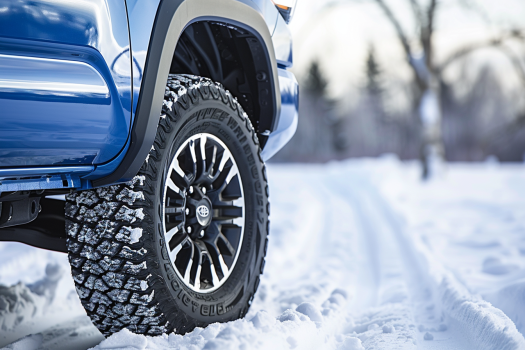
Testimonials from Truck Owners
- Improved Traction on Snow and Ice: Many truck owners report a significant improvement in traction when using winter tires like the Firestone Winterforce CV. One owner mentioned, “Switching to Winterforce CV tires made a night-and-day difference in my truck’s ability to handle snow-covered roads. I feel much more confident driving in winter conditions now.”
- Enhanced Braking Performance: Another common praise is the improved braking performance in cold weather. A testimonial stated, “The stopping distance of my truck has noticeably decreased since I started using winter tires. It gives me peace of mind, especially when driving on icy roads.”
- Better Handling and Stability: Truck owners also appreciate winter tires’ improved handling and stability. One driver remarked, “The Winterforce CV tires have made my truck more stable and easier to control in slippery conditions. I no longer worry about fishtailing or losing control.”
Comparative Performance of the Tires in Winter Conditions
- Snow: In deep snow, winter tires outperform all-season tires by providing better traction and reducing the likelihood of getting stuck. The specialized tread patterns of winter tires, such as the deep grooves and high-density siping of the Winterforce CV, are designed to grip snow effectively.
- Ice: On icy surfaces, winter tires offer a superior grip to all-season tires, thanks to their softer rubber compound that remains flexible at low temperatures. Studded winter tires, in particular, provide even more traction on ice.
- Wet and Slushy Roads: Winter tires are also more effective in wet and slushy conditions. Their wide tread grooves help channel water and slush away from the tire’s contact patch, reducing the risk of hydroplaning.
- Cold, Dry Roads: Winter tires perform better than all-season tires, even on cold, dry roads. Their softer rubber compound ensures they remain supple and grip cold temperatures well.
Conclusion
The Firestone Winterforce CV tires offer numerous benefits, making them ideal for winter driving. Their specialized tread design and cold-weather flexing compound enhance snow and ice traction, ensuring reliable grip and handling. The reinforced construction and high load capacity cater to the demands of commercial vehicles. At the same time, the severe snow service rating and studdable design offer added peace of mind in extreme conditions. Overall, these tires are designed to deliver optimal performance, safety, and durability throughout winter.
So, as we wrap up our comprehensive guide on maximizing your truck’s performance in winter, it’s clear that the correct set of tires plays a pivotal role in navigating the season’s challenges. The Firestone Winterforce CV tires emerge as a standout choice for truck owners seeking a blend of safety, durability, and performance in cold weather conditions.
Why Tires Easy Truck Recommends Firestone Winterforce CV for Winter
At Tires Easy Truck, we understand the importance of equipping your vehicle with the best possible tires for winter driving. We highly recommend the Firestone Winterforce CV tires for truck owners. Their proven performance in real-world conditions and their technical specifications tailored for winter use make them a top choice for ensuring the safety and efficiency of your vehicle during the colder months.
Furthermore, choosing the right winter tires is not just about enhancing performance; it’s also about ensuring your peace of mind as you navigate the challenges of winter driving. With Firestone Winterforce CV tires, you can confidently face snowy, icy, and cold conditions, knowing that your truck is equipped to handle whatever the season throws your way.
As you prepare for winter, consider the Firestone Winterforce CV tires for their unmatched performance and reliability. When purchasing these tires, look no further than Tires Easy Truck. We offer a wide selection of winter tires to meet the needs of every truck owner, with the convenience of online shopping and delivery.
Shop Firestone Winterforce CV Tires at Tires Easy Truck
Equip your truck with the right tires to confidently embrace the winter season. Choose Tires Easy Truck for all your tire needs and experience the difference that quality tires can make in your winter driving experience.
FAQs
Q: Why are winter tires essential for trucks?
Winter tires are designed to provide better traction, handling, and braking performance in cold, snowy, and icy conditions. They are essential for trucks to maintain safety and efficiency during winter.
Q: Can I use winter tires all year round?
While you technically can use winter tires all year, it’s not recommended. Winter tires wear out faster on warm, dry pavement and may provide a different level of performance than all-season or summer tires in warmer conditions.
Q: How are winter tires different from all-season tires?
Winter tires have a softer rubber compound that remains flexible in cold temperatures, providing a better grip on icy and snowy roads. They also feature deeper tread patterns and more siping to improve traction and handling in winter conditions.
Q: When should I install winter tires on my truck?
It’s best to install winter tires before the first snowfall or when temperatures consistently drop below 45°F (7°C). This ensures your truck is prepared for winter driving conditions.
Q: What does the 3-Peak Mountain Snowflake (3PMSF) symbol mean?
The 3PMSF symbol indicates that a tire has been tested and meets the required performance criteria in snow testing to be considered suitable for severe snow conditions.
Q: What are load capacity and speed ratings?
Load capacity is the maximum weight a tire can support, while speed rating indicates the top speed a tire can safely maintain over time. Both are essential factors to consider when selecting tires for your truck, especially for commercial use.
Q: How can I check the tread depth of my winter tires?
You can use a tread depth gauge or the penny test. Insert a penny into the tread with Lincoln’s head upside down. If you can see the top of Lincoln’s head, it’s time to replace your tires.




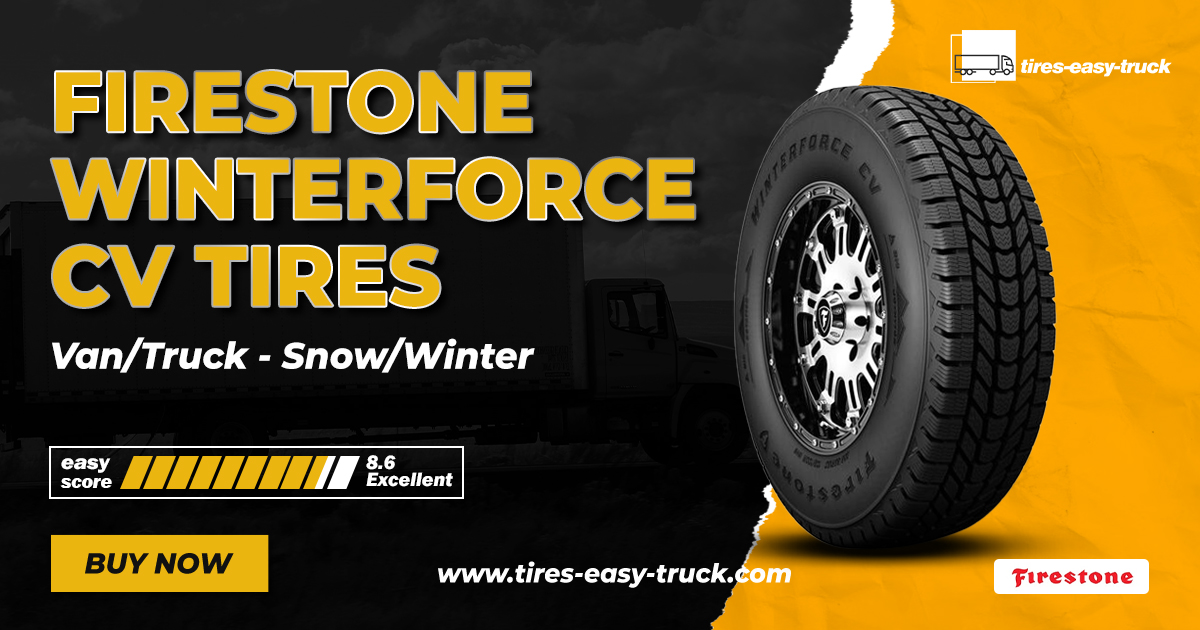


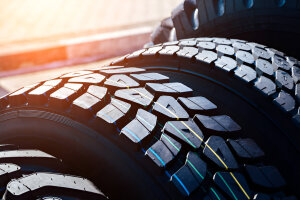
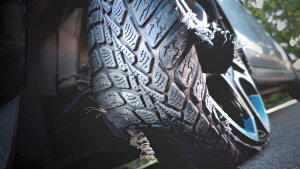


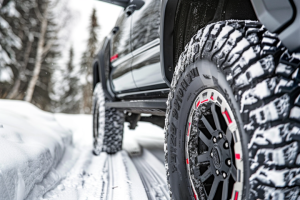
 English
English Français
Français Español
Español